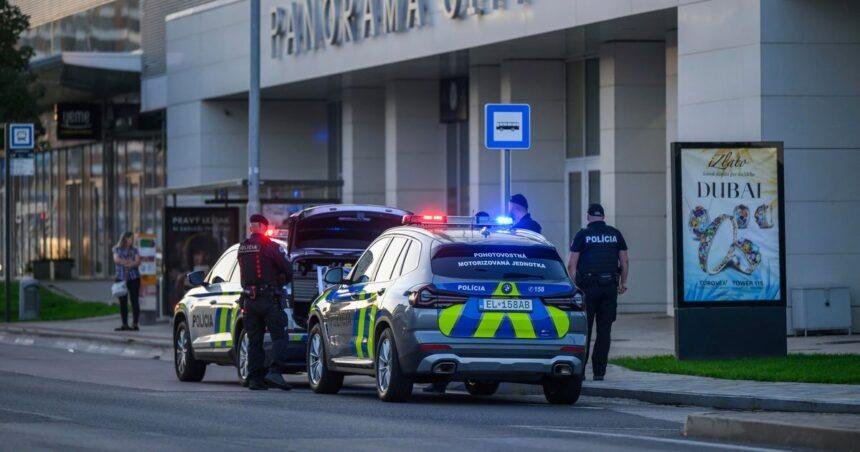World War II Bomb Discovery in Bratislava: A Wake-Up Call from the Past
The recent discovery of a World War II bomb in Slovakia’s capital, Bratislava, has once again highlighted the lingering dangers of unexploded ordnance from the war. This incident, which occurred during construction work, led to significant evacuations and emergency measures, reminding us of the historical scars that still affect many European cities today.
The Incident: Evacuations and Emergency Measures
On Tuesday, September 9, 2025, officials reported the alarming discovery of a 500-pound bomb while construction crews were working on Landererova Street in downtown Bratislava. The immediate response involved evacuating several blocks in the area, including a major bridge that spans the Danube River. Public transportation and all vehicular traffic were halted during the busy morning rush hour, causing significant disruptions.
Experts from the bomb disposal unit were called in to assess the situation and planned to defuse the bomb by midday. The urgency of the situation was underscored by the fact that the area had been a target during World War II, particularly the former Apollo refinery, which was bombed extensively in June and September of 1944.
Historical Context: A City Marked by War
Bratislava, like many European cities, bears the marks of its tumultuous past. During World War II, Slovakia was a Nazi puppet state, and the remnants of that era continue to surface. Ján Ferér, the head of the bomb disposal unit, noted that the original wartime terrain remains intact, and ongoing construction work often uncovers these hidden dangers. “After the raids, the entire complex was buried,” he explained, emphasizing the historical significance of the site.
The discovery of unexploded bombs is not an isolated incident. In recent months, cities across Europe have faced similar challenges, prompting evacuations and emergency responses.
Recent Global Incidents of WWII Bomb Discoveries
Dresden, Germany: A City on Alert
In August 2025, large parts of Dresden were evacuated when experts discovered an unexploded World War II bomb during clearance work for a collapsed bridge. The swift action taken by local authorities ensured the safety of residents and allowed for the safe defusal of the ordnance.
Cologne, Germany: A Massive Evacuation
Earlier in June, Cologne experienced a significant evacuation when three unexploded U.S. bombs were found. Over 20,000 people were affected as city officials worked to neutralize two American 20-ton bombs and one 10-ton bomb, each equipped with impact fuses. The scale of this operation highlights the ongoing risks posed by wartime remnants.
Paris and Northern England: A Continual Threat
In March 2025, a World War II bomb was discovered near the tracks of Paris’ Gare du Nord station, prompting immediate safety measures. Similarly, in February, over 170 bombs were found near a children’s playground in northern England, raising concerns about public safety in areas previously thought to be secure.
Even more alarmingly, in October 2024, a World War II bomb exploded at a Japanese airport, underscoring the global nature of this issue. These incidents serve as a stark reminder that the past is not as distant as we might like to believe.
The Importance of Awareness and Preparedness
The discovery of World War II bombs is not just a historical curiosity; it poses real dangers to modern populations. As construction projects continue to expand in urban areas, the likelihood of uncovering unexploded ordnance increases. This necessitates a proactive approach to safety and awareness.
Community Engagement and Education
Local governments and authorities must engage with communities to raise awareness about the risks associated with unexploded ordnance. Educational programs can help residents understand the historical context and the importance of reporting suspicious findings to the authorities.
Expert Involvement
The role of bomb disposal experts is crucial in ensuring public safety. Their expertise not only helps in the safe defusal of bombs but also in educating the public about the potential dangers. Collaboration between local authorities and bomb disposal units can lead to more effective emergency response strategies.
Conclusion: A Call to Action
The recent discovery of a World War II bomb in Bratislava serves as a poignant reminder of the past and its lingering effects on present-day society. As cities continue to evolve and grow, the risks associated with unexploded ordnance remain a pressing concern.
It is imperative for local governments, communities, and experts to work together to ensure public safety and awareness. By fostering a culture of vigilance and preparedness, we can mitigate the risks posed by these historical remnants.
As we reflect on these events, let us remember that the past is not merely a chapter in history; it is a living reality that continues to shape our world today.

For more information on the ongoing challenges posed by World War II ordnance, you can visit CBS News for detailed coverage.
Note: Internal link placeholders can be inserted where relevant to direct readers to related articles or resources.











